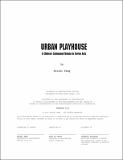Urban Playhouse : a Chinese communal drama in seven acts
Author(s)
Feng, Feifei, M. Arch. Massachusetts Institute of Technology
DownloadFull printable version (54.79Mb)
Alternative title
Chinese communal drama in seven acts
Other Contributors
Massachusetts Institute of Technology. Department of Architecture.
Advisor
Yung Ho Chang.
Terms of use
Metadata
Show full item recordAbstract
The thesis examines the social-political issues resulting from the immense expansion of mundane housing developments in China under a totalitarian state. Initially influenced by the Soviet Union in the 1950s, the four to six-story slab housing blocks became a prevalent model for efficiency and basic welfare. Subsequent housing codes that strictly control spacing, orientation, density, and dimensions have become another driving force of monotonous housing developments. Both the public and private spaces follow the same conformity. The privatized residential blocks offer little public engagement, isolating their inhabitants from one another. Meanwhile, public activities have been institutionalized and paradoxical to the socialist welfare agenda, are also commercialized. Besides being machines for the state, the super structures are essentially bourgeois. Using the slab housing as a backdrop for the urban playhouse, seven groups of follies are deployed to liberate the housing theater from their respective institutional forms. The playhouse seeks to dramatize the nuances of everyday urban life in order to establish new spatial and social relationships. By blurring the boundaries between public and private, actors and spectators, life and art, the acts create the unexpected juxtaposition of events, a continuation of the discourse of heterogeneous space explored by Bernard Tschumi. It is also an exploration of "a theater without theater," an on-going pursuit of avant-garde theaters that call for a collective creation. Additionally, the architectural drama can be seen as a political commentary on current Chinese society. Besides their functional usages, the follies form ruptures or frictions against conformity, the conventional, or convinced. By performing the state of being, we can re-evaluate our living environment, regenerate awareness, and reactivate our desires and dreams.
Description
Thesis: M. Arch., Massachusetts Institute of Technology, Department of Architecture, 2014. This electronic version was submitted by the student author. The certified thesis is available in the Institute Archives and Special Collections. Cataloged from student-submitted PDF version of thesis. Includes bibliographical references (pages 178-180).
Date issued
2014Department
Massachusetts Institute of Technology. Department of ArchitecturePublisher
Massachusetts Institute of Technology
Keywords
Architecture.